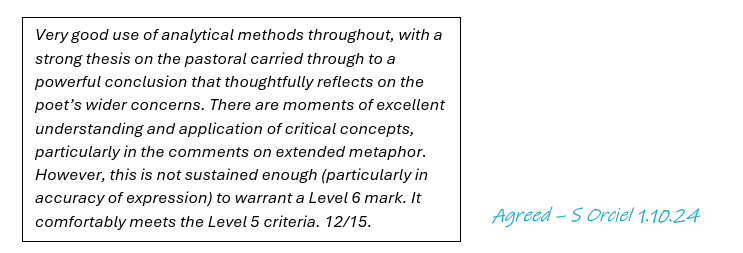English NEAs: evidencing internal standardisation
01 November 2024
Sam Orciel, English Subject Advisor

When it comes to A Level English Non-Examined Assessments (NEAs), internal standardisation plays a critical role in ensuring consistency, fairness, and compliance with exam board regulations. In this blog, I’ll break down the steps to show clear evidence of internal standardisation and show you examples of what that might look like in practice.
The purpose of internal standardisation
Internal standardisation is the process of ensuring that all teachers within a department are marking students’ NEA work consistently and in line with exam board criteria. It involves cross-checking marks and discussing borderline cases to arrive at fair and accurate judgements. This process helps to ensure that all students are judged against the same national standards.
Setting up your internal standardisation
Sections 6.2 and 12 of the JCQ instructions for conducting the NEA provide a useful outline of the process you need to follow.
Ahead of the meeting, teachers should individually complete the relevant NEA training course on OCR Train. Moderation meetings should take place in a format that avoids any interruption, and you should have the mark scheme (from the specification) to hand. You should also have at least two teachers mark or review a sample of each other’s students’ NEA work. One person should manage this process and sign the CCS160 form to confirm that internal standardisation has taken place.
Annotating NEA work
When your moderation sample is sent to OCR, our moderators are looking for clarity and consistency in how internal marks were arrived at. For example, our specification for A Level English Literature says:
‘Teachers must clearly show how the marks have been awarded in relation to the marking criteria. A combination of the following approaches should be adopted:
- Summary comments either on the work (usually at the end) or on a cover sheet.
- Key pieces of evidence flagged throughout the work by annotation either in the margin or in the text.
Indications as to how marks have been awarded should:
- be clear and unambiguous
- be appropriate to the aims and objectives of the work
- facilitate the standardisation of marking within the centre
- enable the moderator to check the application of the assessment criteria to the marking.’
There is more than one way to achieve this, but below are a few examples of what clear internal standardisation might look like.

Here, the first marker has made a clear comment linking a specific section of the candidate’s work to an Assessment Objective. The second marker has noted their agreement and named a Level which reflects the language of the mark scheme for that Level. It is visually evident that these are comments from two different markers; this could also be achieved by initials after each comment.

Along with other aspects from the previous example, this shows how you might signal an error or disagreement with the first marker. The tick symbol indicates that the second marker’s comment has been acknowledged and therefore applied to a revised mark for this piece.

In this summative comment, there is clear articulation of the specific strengths and weaknesses of the NEA piece by the first marker, and a signed and dated confirmation from the second marker. The comment uses the language of the appropriate Level of the mark scheme to reinforce the rationale for the mark awarded.
Solo teachers
If you are the only teacher of English at your centre, we’d advise you to identify someone else in your centre who is delivering a similar NEA in another subject or has the relevant subject knowledge to complete the processes above, but on a smaller scale. You might find suitable colleagues working in history, sociology, media studies, law or drama.
Final steps
Remember that you have the option of either postal submission or digital submission of NEA samples, using Submit for Assessment. Whichever option you choose, please make sure that cover sheets are completed, and candidate work is paginated and includes names and candidate and centre numbers.
Stay connected
Share your thoughts in the comments below. If you have any questions, you can email us at English@ocr.org.uk, call us on 01223 553998 or message us @OCR_English. You can also sign up to subject updates to keep up-to-date with the latest news, updates and resources.
If you are considering teaching any of our qualifications, use our online form to let us know, so that we can help you with more information.
About the author
Prior to joining OCR in September 2022, Sam spent ten years teaching a range of English qualifications in secondary schools, including as a head of department. She did this alongside completing a MSt in Advanced Subject Teaching at the University of Cambridge, specialising in A Level English curricula and pedagogy.
In her spare time, you’ll find her either fussing over her dog, watching tennis, or (predictably!) reading anything and everything.